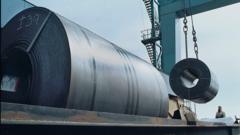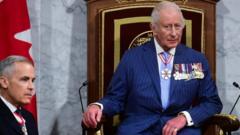As Germany faces a significant infrastructure crisis, the new government led by Friedrich Merz is set to invest heavily in revitalizing the nation’s efficiency and productivity by enhancing its aging systems.
Germany's Infrastructure Crisis: A New Hope Under Friedrich Merz

Germany's Infrastructure Crisis: A New Hope Under Friedrich Merz
Friedrich Merz, poised to become Germany's next chancellor, focuses on reinvigorating the nation's crumbling infrastructure amidst a looming economic transformation.
Germany is currently grappling with a deteriorating infrastructure, typified by crumbling bridges and outdated facilities, a legacy of decades of underinvestment. Incoming Chancellor Friedrich Merz has taken decisive action, persuading lawmakers to lift constitutional spending limits, allowing the government to inject 500 billion euros (approximately $556 billion) into infrastructure projects over the next 12 years.
With this landmark decision, a significant portion of the funds, amounting to €200 billion, is earmarked for the states and an innovative climate fund. The Christian Democrats and their coalition partners from the Social Democratic party will target €150 billion directly at essential infrastructure improvements before completing their term in 2029.
Experts have expressed optimism about the prospects of rejuvenating Germany’s once-boastful industrial status, which has significantly deteriorated over recent years. A major focus will be construction and repair of critical infrastructures such as bridges and highways, which have fallen into disrepair alongside the nation’s reputation for high efficiency.
Friedrich Merz’s leadership will not only address the immediate concerns surrounding infrastructure decay but will also pivot towards long-term sustainability, benefiting both the environment and the economy in a time of global transitions. The success of these infrastructure investments will play a crucial role in reclaiming Germany’s status as a leader among industrialized nations.
As the country anticipates major changes with Merz at the helm, the hope is that, backed by substantial financial resources, Germany can emerge from its current challenges stronger and more resilient than before.
With this landmark decision, a significant portion of the funds, amounting to €200 billion, is earmarked for the states and an innovative climate fund. The Christian Democrats and their coalition partners from the Social Democratic party will target €150 billion directly at essential infrastructure improvements before completing their term in 2029.
Experts have expressed optimism about the prospects of rejuvenating Germany’s once-boastful industrial status, which has significantly deteriorated over recent years. A major focus will be construction and repair of critical infrastructures such as bridges and highways, which have fallen into disrepair alongside the nation’s reputation for high efficiency.
Friedrich Merz’s leadership will not only address the immediate concerns surrounding infrastructure decay but will also pivot towards long-term sustainability, benefiting both the environment and the economy in a time of global transitions. The success of these infrastructure investments will play a crucial role in reclaiming Germany’s status as a leader among industrialized nations.
As the country anticipates major changes with Merz at the helm, the hope is that, backed by substantial financial resources, Germany can emerge from its current challenges stronger and more resilient than before.






















